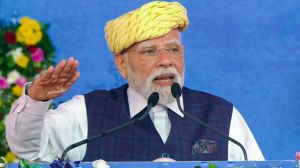Women vote and participate in Kuwait for the first time
Women went to the polls on Thursday for the first time in Kuwait, voting for parliament members in an election that has shaken up politics-as-usual in the conservative oil-rich emirate.

Women went to the polls on Thursday for the first time in Kuwait, voting for parliament members in an election that has shaken up politics-as-usual in the conservative oil-rich emirate.
Women, who won the right to vote and run for office last year, went to separate polling stations from men. There are 28 female candidates among the 252 people running in the election, and women make 57 percent of voters.
‘‘It feels like a wedding day,’’ said Salwa al-Sanoussi, a 45-year-old house wife, one of the first to arrive at a women’s polling station in Dahyia, one of Kuwait’s wealthiest areas. She wore black and covered her hair with a matching headcover.
With Thursday’s vote, Saudi Arabia is now the only Arab country that holds elections but doesn’t allow women to vote.
Even fundamentalist Muslims who opposed giving women the right to vote have campaigned for their support in the weeks heading up to Thursday’s election.
But the entry of women is not the only new twist in the election. The vote has sparked a surprisingly vocal campaign for reform in Kuwait, where the ruling Al Sabah family heads the government and has a strong influence over politics.
During the campaigning, reformist candidates—swho include Islamic fundamentalists and secular activists—spoke out harshly against corruption, accusing ministers and even members of the ruling family of mismanagement and wasting state land.
At one point, the emir, Sheik Sabah Al Ahmed Al Sabah, expressed his “deep hurt and dismay” over what he called the “low level of dialogue,” in the campaigns— though the government did not attempt to clamp down on it.
Photos



- 01
- 02
- 03
- 04
- 05




























